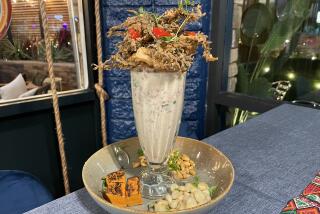A little knowledge is a good thing for hangovers
Gearing up for a big night on New YearŌĆÖs Eve? One that will involve some drinking? Then maybe you need a little primer on hangovers, since you could be nursing one soon.
You may already be familiar with the symptoms: The Mayo Clinic lists headache, nausea, vomiting, rapid heartbeat, thirst, not being able to concentrate and dizziness. What causes a hangover? Drinking too much, of course, which leads to a cascade of ill effects.
Imbibing can lead to urinating more, says the clinic, which can cause dehydration, then thirst and possibly dizziness. All that booze can do a number on your stomach lining too, irritating it and making you feel like you want to hurl.
Alcohol can also cause your blood vessels to expand, leading to headaches. It can also lead to a bad blood sugar crash that may leave you shaking and feeling weak.
So, what can you do about them? Not much, apparently. A 2005 meta-analysis in the British Medical Journal looked at studies of various alleged remedies, including tropisetron (a nausea drug), propranolol (a beta blocker that affects blood flow), tolfenamic acid (a nonsteroidal anti-inflammatory) and fructose or glucose (supposedly they tamp down the metabolic effects of ethanol). The studies also examined the success of various dietary supplements, including prickly pear.
The study authors found no convincing evidence that any conventional or complementary remedies can prevent or cure a hangover. They added that until more is known about what happens in the body to cause a hangover, a true remedy may be tough to pin down.
The authors also offered this nugget: ŌĆ£The most effective way to avoid the symptoms of alcohol induced hangover is to practice abstinence or moderation.ŌĆØ
Tempted to try an over-the-counter remedy? Read this first.
How much of a toll can a hangover take on your ability to think and function? A 2010 study in the journal Addiction gave 193 college students alcohol or a placebo and had them take some tests the next day. Researchers measured test-taking performance, neurocognitive performance and mood.
Test-taking performance wasnŌĆÖt affected by drinking, but mood state and attention and reaction time were.
If youŌĆÖre wondering whether certain types of alcohol can elicit more of a hangover than others, a 2010 study in Alcoholism: Clinical & Experimental Research looked at exactly that. Researchers tested the effects of bourbon and vodka on 95 healthy heavy drinkers who drank to the point of being drunk. Alcoholic beverages contain substances called congeners, toxins that are created during fermentation. More are found in darker alcoholic beverages such as red wine and whiskey.
The study participants said they felt worse after drinking bourbon, but other than that there were no differences seen on attention and speed tests, sleep disturbance or feeling sleepy the next day.
So pick your poison wisely, and do it moderation. You have been warned.






